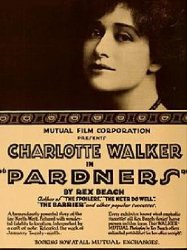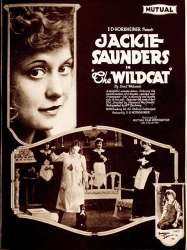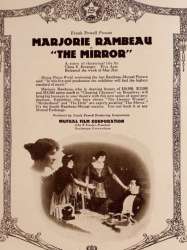Mutual Film

- Infos
- Best films
If you like this company, let us know!
Mutual Film Corporation was an early American motion picture conglomerate best remembered today as the producers of some of Charlie Chaplin's greatest comedies.
It originated with the partnership behind Western Film Exchange, founded in Milwaukee, Wisconsin in July 1906 by Wisconsin natives John R. Freuler (1872-1958), Harry E. Aitken (1877-1956) and Roy Aitken (1882-1976).
In 1910, Freuler would also form a partnership with Chicago film distributor Samuel S. Hutchinson known as the American Film Manufacturing Company.
It was early in 1912 when, with the Shallenberger brothers (Wilbert E. and William Edgar), Crawford Livingston, and others as investors, Charles J. Hite, the President & CEO of Thanhouser Film Corporation, joined John R. Freuler and Harry E. Aitken in the formation of Mutual Film. Hite eventually died in 1914.
As 1912 progressed, the company included auxiliary units such as Keystone Studios Comedies, the Majestic Studios (which would later become the Reliance-Majestic Studios through Harry Aitken's partnership with D. W. Griffith), and the New York Motion Picture Company. In 1915, the workers of Keystone Studios, Kay Bee Studios (a subsidiary of the New York Motion Picture Company) and Reliance-Majestic Studio left Mutual, along with the Aitken brothers, to form the Triangle Film Corporation. Now as complete owners of the former Reliance-Majestic Studio, by 1917 the conglomerate operated as the distributor for four subsidiary studios in California, three of which were in the Los Angeles area and the other in Santa Barbara. They were Signal Film Corporation, Vogue Films, Inc., Lone Star Film Company and American Film Company. Vogue Films, Inc. operated a studio at Santa Monica Boulevard and Gower street in Los Angeles producing two-reel comedy films exclusively.
In 1915, the United States Supreme Court ruled in Mutual Film Corporation v. Industrial Commission of Ohio that motion pictures were a form of business, not an art form, and therefore not covered by the First Amendment.
Shortly after this decision, cities began to pass ordinances banning the public exhibition of "immoral" films, concerning the major studios that state or federal regulations would soon follow. This ruling remained in effect until Joseph Burstyn, Inc v. Wilson in 1952 which declared that film was a legitimate artistic medium with free speech protections.
In 1916, Charlie Chaplin became the highest paid entertainer in the world when he signed a contract with Mutual for a salary of $670,000 per year. Mutual built Chaplin his very own studio and allowed him total freedom to make twelve two-reel films during this fruitful twelve-month period. Chaplin subsequently recognised this period of film-making as the most inventive and liberating of his career, although he also had concerns that the films produced were increasingly formulaic during the length of his contract.
During 1916 and 1917, the Lone Star Film Company had Charlie Chaplin working at their studio at 1025 Lillian Way, in Hollywood. Charlie Chaplin moved on to found United Artists in 1919 with Mary Pickford, D. W. Griffith, and Douglas Fairbanks. In 1919, Mutual Film Corporation ceased production. Like many other companies established at this time, Mutual was eventually absorbed by larger corporations, in this case Film Booking Offices of America and later RKO Radio Pictures.
With the exception of the Chaplin films, most of the Mutual shorts and feature dramas are lost to time and decompostion.
After a 53-year absence, MFC distributed one film, Tears of Happiness, in 1972.
Filmography of Mutual Film (181 films)
Distribution

Beloved Rogues (1917)
Directed by Alfred Santell
Origin USA
Genres Comedy-drama
Actors Clarence Kolb, Clarence Burton, Harry von Meter, Tom Chatterton
The film is about a business deal involving a personal endowment.
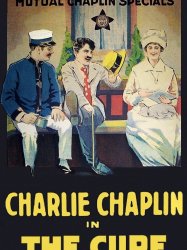
The Cure (1917)
, 30minutesDirected by Charlie Chaplin
Origin USA
Genres Comedy
Themes Films about alcoholism, Medical-themed films, Films about drugs
Actors Edna Purviance, Eric Campbell, Charlie Chaplin, Henry Bergman, John Rand, Albert Austin
Chaplin plays a drunkard who checks into a health spa to dry out, but brings along a big suitcase full of alcohol. Along the way he aggravates a large man suffering from gout, evades him and encounters a beautiful young woman who encourages him to stop drinking. However, when the hotel owner learns his employees are getting drunk off Charlie's liquor, he calls an employee and orders him to have the liquor thrown out the window.

The Gentle Intruder (1917)
, 50minutesDirected by James Kirkwood Sr.
Origin USA
Genres Drama
Actors Mary Miles Minter, George Fisher, Eugenie Forde, Harvey Clark, Franklin Ritchie, George Periolat
Sylvia is the niece of a man who leaves her a fortune. However, his lawyer, Mr. Baxter, uses the money to support himself and his wife. Sylvia gives him a visit, but isn't wanted there. She falls in love with his son Arnold, who has a drinking and gambling problem. While she is trying to get him straightened up, Arnold find out his parents are keeping Sylvia's money for their own.

Mary Moreland (1917)
Directed by Frank Powell
Origin USA
Actors Marjorie Rambeau
As described in a film magazine review, Thomas Maughm (Elliott), a Wall Street broker and unhappily married, finds himself in love with his secretary Mary Moreland (Rambeau). He confesses his love and she leaves his employ. After Mary has traveled around in various positions, she returns home. She learns of the death of Thomas' wife and this time she listens to his confessions of love.
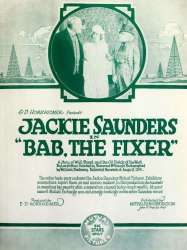
Bab the Fixer (1917)
Origin USA
Genres Comedy-drama
Actors Jackie Saunders, Mollie McConnell, R. Henry Grey
Bab Porter is a young girl who moves west with her family after her stockbroker father John Porter loses their money through bad stock investments. After 10 years of living on the Ranch, Bab has all the characteristics of a cowgirl. Bab falls in love with Richard Sterling, a former clerk and self-made man. Bab’s mother does not approve of the match and wishes her daughter to marry up in social status. After the Porter family discovers oil on their ranch, Bab’s mother sends her to finishing school back east to assist her in landing a suitable husband.
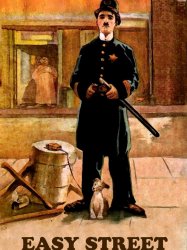
Easy Street (1917)
, 19minutesDirected by Charlie Chaplin
Origin USA
Genres Comedy, Action
Actors Edna Purviance, Eric Campbell, Charlie Chaplin, Albert Austin, Henry Bergman, Lloyd Bacon
In a slum called Easy Street, the police are failing to maintain law and order.

The Immigrant (1917)
, 20minutesDirected by Charlie Chaplin
Origin USA
Genres Drama, Comedy, Romance
Themes Seafaring films, Transport films
Actors Edna Purviance, Eric Campbell, Charlie Chaplin, Albert Austin, William Gillespie, Henry Bergman
The film begins aboard a steamer crossing the Atlantic Ocean, and initially showcases the misadventures of an unnamed immigrant, the Tramp (Chaplin) who finds himself in assorted mischief while, among other things, playing cards, eating in a mess hall, and avoiding seasick passengers. Along the way, he befriends another unnamed immigrant (Purviance) who is traveling to America with her ailing mother. The two are robbed by a pickpocket who is losing in gambling. The Tramp, feeling sorry for the two penniless women, attempts to secretly place his winnings from his card game in the woman's pocket, but ends up being mistakenly accused of being a pickpocket. The woman manages to clear the Tramp's name. Upon arrival in America, the Tramp and the woman part company.

Peggy Leads the Way (1917)
Directed by Lloyd Ingraham
Origin USA
Genres Drama
Actors Mary Miles Minter, Andrew Arbuckle, Mabel Taliaferro, Carl Stockdale, Allan Forrest, Margaret Shelby
As described in a film magazine, Peggy (Minter) gives her father (Arbuckle) a surprise visit and after the lavish style he has maintained her in at boarding school, she is amazed to find the business he runs in such a dilapidated condition. She starts a new system of doing things and soon the grocery store starts making a profit. Clyde (Forrest), son of the ruthless and wealthy landowner Roland Gardiner (Stockdale), meets Peggy and falls in love with her. His father disapproves of her and insists that the son marry Maude Greenwood (Shelby). A storm plays havoc with the Gardiner mountain home, leaving them without food or supplies, and Maude and her mother depart in anger. Roland Gardiner seeks refuge in the little grocery store, and after Peggy takes advantage and provides some provisions at outrageously inflated prices, comes to the conclusion that she is the right girl for his son after all.

Please Help Emily (1917)
Directed by Dell Henderson
Origin USA
Genres Drama, Comedy, Comedy-drama
Themes Films based on plays
Actors Ann Murdock, Amy Veness, Ferdinand Gottschalk
As described in a film magazine, Professor Delmar (Druce) is sent to China to study child-life and decides to leave his daughter Emily (Murdock), who is always getting into trouble, with his good friends the Lethbridges. One night Emily runs away from a musicale and attends a cabaret. Not knowing how to explain matters and feeling sure that Trotters (McDougall), a friend, can help her out, she goes to his apartment. Waiting for him to return from the club, she takes a nap. Mrs. Lethbridge (Veness), not wishing her husband to know of Emily's escapade, tells him that Emily is staying with her aunt, who has the mumps. Trotter is told of the story and, wishing to make it good, plans to take Emily to her aunt's house. They stop at a hotel for lunch. Emily has her dog hidden and tells Trotter that it is lost and that she will not leave the hotel until it is found. Julia (Carlyle), the fiancee of Trotter, decides to visit the sick aunt. She is accompanied by Herbert Threadgold (Gottschalk) a nervous little body who is in love with Emily. Their automobile breaks down and they are forced to stay at the same hotel that Emily and Trotter are staying. Aunt Geraldine follows and they are all arrested for kidnapping Emily, but through the efforts of Lethbridge (Brown) they are all released. Julia marries Threadgold and, to avoid a scandal, Emily marries Trotter, not that either objects.
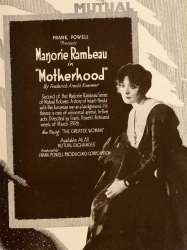
Motherhood (1917)
, 50minutesDirected by Frank Powell
Origin USA
Genres Drama
Actors Marjorie Rambeau, Robert Elliott, Agnes Ayres, Robert Elliot
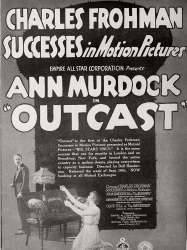
Outcast (1917)
Directed by Dell Henderson, Wesley Ruggles
Origin USA
Genres Drama
Themes Films based on plays
Actors Ann Murdock, David Powell, Catherine Calvert
As described in a film magazine, Valentine (Calvert), engaged to Geoffrey (Powell), breaks her engagement so that she can marry Lord Moreland (Carrington) so that she may have everything that she desires. Discouraged, Geoffrey associates with Miriam Gibson (Murdock), a woman of the streets known as the outcast. Miriam becomes devoted to Geoffrey and does all that that is in her power to make him happy. Valentine is jealous because Geoffrey is so happy and believes that by coming into his life she will make it hard for him. Geoffrey, who still loves her, asks her to go away with him to South America, divorce Lord Moreland, and marry him. But Valentine refuses to give up London. So Geoffrey sends Valentine away and marries Miriam, and the two happily set out for their South American home.
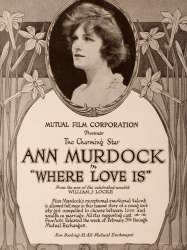
Where Love Is (1917)
Origin USA
Genres Drama
Actors Ann Murdock, Bigelow Cooper, Mabel Trunnelle, Raymond McKee
 Connection
Connection
